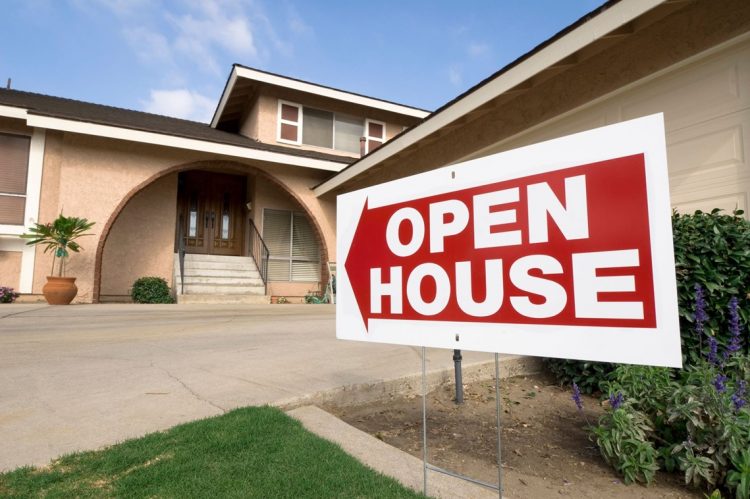On a postcard-perfect Thursday morning in mid-September, at two open houses in tony Westport, Connecticut, listing agents Maryann Ross-Levanti and Kim Harizman each spent several hours hosting as fellow REALTORS® and potential buyers came-a-calling. Both Ross-Levanti’s $4.2 million property and Harizman’s $800,000 home had just gone up for sale.
While representing abodes in the town’s high-end (but not highest) and low-end price range, the two real estate professionals agreed that while many aspects of the business are in flux, especially post-NAR settlement, open houses are still valuable and worth their time. Each explained how they go about presenting properties to walk-ins, as well as potential buyer agents.
Ross-Levanti told how she asks homebuyer hopefuls when they arrive whether or not they’re represented.
“‘Are you working with an agent’ is always the first question,” she says. “Because it is the first face-to-face meeting. We’ve done this for years…this is nothing new. It’s just the buyers who are confused now. If it’s a bidding war, a fast market, it makes it difficult for buyers. Not only do they have to figure out the price they want to pay, they have to figure out if they are paying their own agent or if the seller is covering their agent.
“Depending on the answer affects the amount of money they may want to offer. That hurts buyers. It slows them down. It’s not a good thing for transparency.”
On the same theme, Harizman notes that who pays the buyer agent is something that is still a work in progress, especially when open houses can have actual buyers attend with other agents.
“Would an agent walk into my open house and ask, ‘Are you offering a buyer agency commission?’ Maybe. We’re very, very transparent about that. All the agents across all brokerages are sharing, to the best of their ability, the buyer-agency commissions. On their websites, in their emails…you can’t put it in the MLS, but you can put it anywhere else.”
Harizman says the new rules sometimes mean she has to educate open house homebuyer attendees.
“It’s actually made our job easier (in Connecticut) because in the past, not everywhere did you have to sign a buyer-agency form,” she says. “We sometimes got pushback from buyers. I tell them, ‘Now this is a national law. We’ve always done it, but I can’t show you this house unless you sign a piece of paper.’”
The paper does not commit them to a buyer agent; it simply says whether or not they are represented.
The two listing agents take different approaches to potentially becoming a dual agent if an open house attendee is not yet represented. Ross-Levanti is happy to take on both roles (and both commissions). Harizman? Not so much.
“I’ve been a dual agent for years; it’s nothing new,” says Ross-Levanti. “The only difference is, if you are a dual agent, rather than having fiduciary (responsibilities), you’re basically just transferring facts. You’re leaving your opinions out of either side. That is up to the buyer and seller anyway, and always has been in Connecticut. You have to have a different form signed if you’re a dual agent, with both sides agreeing. It’s not a big deal. It’s just a matter of trust.”
Harizman prefers to work strictly for one side or the other.
“Not unless they ask, honestly,” she says. “I think it’s way cleaner if it’s my listing to have another agent on the other side. I prefer it.”
Harizman and Ross-Levanti both pointed out that Connecticut has had buyer-agent rules for 15 years, so there’s not the big changes there are in some other states. The settlement rules have made things more strict on multiple levels.
“Given that buyer agency must be established in writing prior to the first showing, I think it has changed agents’ approach of prospecting from open houses,” says Sara Briseno Gerrish, a broker/owner with RE/MAX Unlimited in San Antonio, Texas. “It was common for an agent to host an open house for someone outside their brokerage. Because our brokerage does not allow subagency, we do not allow this practice. Our agents are only allowed to host open houses at listings that are in-house listings.
“I know when the settlement was initially announced, agents were concerned that open houses were going to be a thing of the past. Agents are still hosting open houses, which is still a great form of prospecting. Texas has a Representation Disclosure form that clearly explains who the host agent represents, and we require our agents to have that form posted.
“Our awareness has not changed whether a guest is represented or not. We are trained to ask that upfront, and if they are represented, we respect that agency relationship.”
High and low strategies
Ross-Levanti was expecting to have many REALTORS® come to her newly built house, even though very few would have homebuyers looking in the $4 million-plus range. “You must know all the details for every single property available in the area, regardless of price,” she said about agents. “You never know when you might get a phone call from someone looking for something like this.”
As for her $800k home, constructed in 1948 and showing its age with dark blue kitchen cabinets and brown wood wall paneling in the lower level, Harizman was confident it would not only sell quickly, but above list. “It’s an acre and a half on a flat lot, so builders will be interested in it as well as homebuyers,” she says.
Both agents agree that open houses have changed over the past few years.
“They’ve changed since Covid…have they plateaued a little bit? Maybe,” says Harizman. “Instead of getting 10 offers, are we only getting four? Yes. But open houses are still worthwhile, especially the first weekend when there’s a lot of activity. It’s a great opportunity to get a lot of people through the property in a short window of time. I like to be present at showings.”
Ross-Levanti agrees that Covid was a factor in fewer people attending open houses, while also pointing out that inventory is an issue.
“We are probably 30% fewer homes sold this year than last year, and 30% fewer sold last year than the year before,” she says. “We have about 70 houses for sale in Westport. Pre-Covid we’d have 350. It’s also much tighter on the top. The old rule was that the top 10% of agents do 90% of the business. Now the top 5% do 95% of the business. It’s incredibly difficult for new agents, especially with buyers and sellers and mass media confusion out there.
“There are fewer open houses because things don’t stay on the market as long, in addition to many fewer houses. Go back to 2017, 2018, 2019 with 300-odd houses sitting on the market every week, you’re gonna have a lot more open houses.
“Buyers got out of the habit of asking their agent to take them to look at 10 houses. Everything has shrunk. People used to look at houses to get educated. They can’t do that anymore because the house they’re looking at will be gone before they look at five other similar houses.”
Chris Heller, co-founder of Agent Advice, an industry resource for helping agents make decisions to grow their businesses, feels that open houses are pretty much the same pre- and post-settlement, and are effective as ever.
“Open houses haven’t changed since the settlement…how they’re held, why they’re held and what the consumer experiences has not changed,” he says. “What has changed is the importance of them to agents because an open house is an opportunity to meet more buyers and to present their value proposition, and to get an agreement signed or an agreement to work together. So, when there’s a race to meet as many buyers as possible, open houses now are more important than ever.”
Heller acknowledges that it is the best agents who will prosper, because they go the extra mile.
“The good agents will be more aggressive in engaging with the consumers at an open house,” he notes. “A lot of times, a consumer may have signed an agreement, but finding out if it’s an exclusive agreement, or for how long, are things that good agents will do.”
Finally, Pam Rosser Thistle, an agent with Berkshire Hathaway HomeServices Fox & Roach, REALTORS® in Philadelphia, takes proactive measures to draw interest to her open houses.
“As a listing agent, I encourage buyer agents to send their buyers to my open houses as a way to see the home,” she says. “For example, this weekend I’m holding an open house for the sole purpose of making it easy for a represented buyer (the wife of an interested party from last weekend’s open house) to see the home in person. Her agent lives and sells mostly outside of Center City Philadelphia where my listing is, and I want to make it easier for him.
“We’ve been talking on the phone to line up details. These days, a lot can be handled virtually. I have also had unrepresented buyers who have interest in the home attend open houses. I usually encourage them to connect with a buyer agent since my allegiance is to the seller.”












